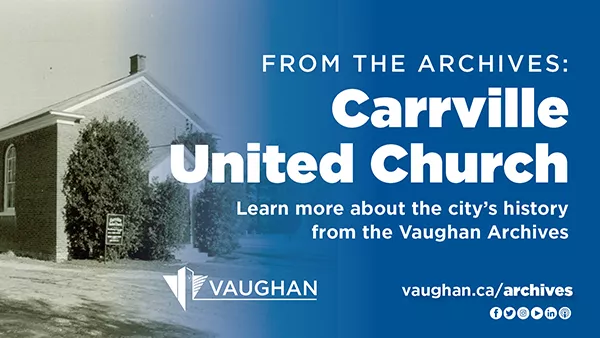From the archives: Carrville United Church
Learn more about the city’s history from the Vaughan Archives
From the traditional territories of the First Peoples of Turtle Island, to a farmland community, to a bustling city centre and everything in between – Vaughan’s transformation is a story worth telling. As part of a monthly series, the City of Vaughan is releasing historical content from the Vaughan Archives, Office of the City Clerk. Citizens are encouraged to scroll through memory lane, learn about the city’s past and explore the places, people and events that were pivotal to the development of the city of Vaughan we know today.
The Carrville Church began as a station on the Markham Circuit of the Primitive Methodist Church. Originally, the settlement was known as Cook’s Mills, and members of this congregation met in local homes until the population swelled. Around 1850, a frame church was erected on the northeast corner of Carrville Road and Bathurst Street. This church was used by a congregation for less than a decade and later became a private dwelling for the Bone family.
The present-day Carrville Church was built in 1857 using homemade bricks that were produced near the site. It was located on Lot 16, Concession 2, west of Bathurst Street and north of Rutherford Road. The land and building were gifts of Thomas Cook, who also provided lodging for the men who helped build the church and a free home for the minister and his horse. The Cook family, who came from England in 1833, made significant contributions to the church and the community throughout their lifetimes.
Missionary reports and Primitive Methodist Journals indicate that Carrville Church was prosperous during the late 1800s with numerous reports of improvements and additions. In 1871, the church purchased two chandeliers in addition to paying off its organ. Around this time, the church exterior was also painted and the altar cushioned and carpeted. In 1883, the Ladies’ Aid Society of Carrville raised funds for the reseating of the church. This prosperity was largely due to the efforts of several influential members, in addition to Thomas Cook.
In 1884, the church became part of the Maple circuit which was comprised of Maple, Hope, Edgeley and Concord. In 1915, the Carrville Church joined with Edgeley and Concord to form an Edgeley circuit. When this circuit was disbanded in 1921, the church became associated with Headford and Richvale and eventually became the Carrville United Church in 1925. In 1934, the circuit changed to Carrville, Headford, Victoria Square and Thornhill, ultimately becoming associated with Maple since 1971.
The cemetery located to the east side of the church, is now under the care of the City. With headstones dating back to the 1860s, the cemetery acts as an additional monument to the history of the church. It was one of the first parts of Vaughan Township to be settled.
ABOUT VAUGHAN ARCHIVES
Established in 1988, the City of Vaughan Archives is home to more than 600 collections, consisting of both City records and cultural records about Vaughan from 1860 to present day. Records include, but are not limited to, the following:
- City business records with long-term legal and administrative value, such as Council meeting minutes, by-laws, assessment rolls, financial records, reports and official correspondence
- church, community and school records
- census records
- historical photographs
- land records
- historical maps, plans and aerial photographs
- newspapers
- personal papers of past residents and founding families, such as diaries, family histories, journals and letters
- records of local organizations both past and present
VIEW VAUGHAN’S ARCHIVES ONLINE!
As part of the City's COVID-19 response, Vaughan City Hall remains closed to the public – but the City’s Archival Collection is on digital display for all to explore! The below galleries are now available in the City’s online gallery on Flickr:
- Featured Artists of Vaughan
- Historical Families of Vaughan
- Historical Figures: Lord Beaverbrook
- Historical Photography
- Recollections of Rural Vaughan
- The Mary Wood Collection
- The Way We Were: Representations of Vaughan’s Past
- Vaughan Working Environments
- Vaughan Through the Ages: Medicine
- Vaughan Through the Ages: Music
- Vaughan Through the Ages: Sports and Recreation
- Stories of Remembrance
- Vaughan’s Forgotten Heroes
A personal Flickr account is not required to access the City’s online gallery, which contains only a small selection of the full archives collection. If you are looking for a certain image, original file, primary source record or more, contact the Vaughan Archives by calling 905-832-2281 or emailing archives@vaughan.ca.
By managing and preserving both City and community records, the Archives and Records Management Services team ensures that Vaughan’s rich and varied history will continue to be available for future generations. Learn more at vaughan.ca/archives.
-30-

